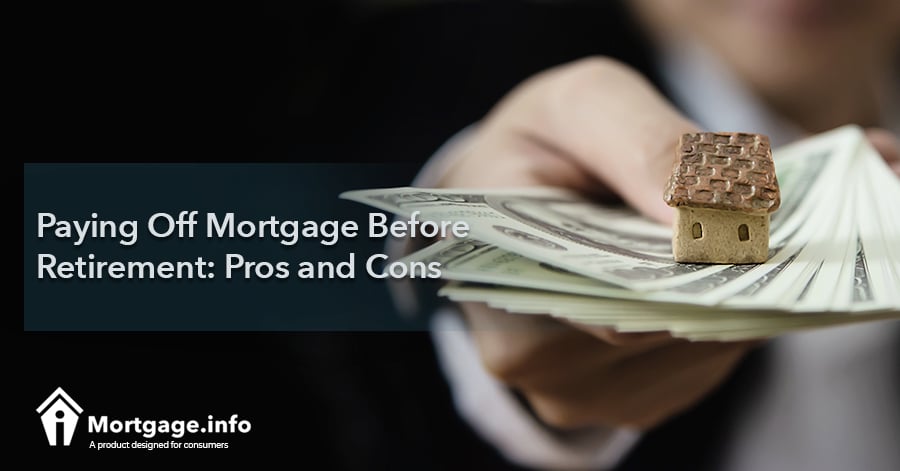
If you have dreams of living debt free during retirement, you are not alone. When you no longer have a job, it may make you feel better to be without a mortgage or any other large debts. However, a mortgage may provide you with a few benefits. It depends on your situation.
Compare Offers from Several Mortgage Lenders.
Below we’ll cover the reasons to keep your mortgage during retirement and reasons to pay off your mortgage before retiring.
Keeping Your Mortgage
It seems odd to want to keep a debt if you are nearing retirement, but it does have its benefits. Remember, your house is an investment, but it’s not a liquid one. You cannot sell it in the blink of an eye. If you need to tap into those funds, you would need to find a buyer and go through the whole loan/closing process. This could take many months. Keep reading to learn the reasons keeping your mortgage might be beneficial.
You Have Existing Debts
If your mortgage isn’t your only debt heading into retirement, you should pay those off first. The only exception would be if the interest rates/fees are lower on those debts than the mortgage. Retiring with too many debts on your plate could make what should be your golden years filled with worry.
You Have Little Savings
Savings are the key to living comfortably. This includes both savings for when you are retired and emergency funds. If you started saving for retirement late in life, you may want to put the extra funds you have available towards your 401K or IRA rather than your mortgage. You need the interest to compound while you are still working.
The same is true if you don’t have an emergency fund. Retirement savings won’t help when your car breaks down or you have a medical emergency. You need liquid funds available at a moment’s notice. If you don’t have six to twelve months of monthly expenses saved, put your extra money in a liquid account, rather than tied up in your home.
You Need Diversification
Diversifying your assets is the best way to stay afloat. There’s no way to predict what any part of the market will do. This includes the stock/bond market and the real estate market. If you put all of your money into your home and the housing market takes a dive again, you just lost most of your investment. If, on the other hand, you pay your mortgage as required and invest your available funds in stocks, bonds, mutual funds, and other investments, you are diversified. This way if one market does take a dive, you have the others still keeping some of your money afloat.
Pay Off Your Mortgage
Most people think it makes sense to pay off the mortgage before retiring. We don’t disagree. The following reasons are something to consider when making your decision.
Click to See the Latest Mortgage Rates.
You’ll Save on the Interest Costs
Interest is the one reason many people want to pay the mortgage off as fast as possible. It eats away at your possible savings. If you pay your mortgage off early, you cut the interest down drastically. You can then use those funds to diversify in other investments, as we discussed above. If your interest costs are high, you may want to work on paying the principal balance down to cut down the total cost of interest over the life of the loan.
You Have a Fixed Income
Living on a fixed income often makes paying a mortgage quite the burden. If you know you’ll live on social security or pension income, you may want to work hard to pay off your mortgage before you retire. Depending on the amount of your mortgage payment, it could take up a sizeable portion of your fixed income which could make living your golden years in peace more difficult.
You Have Excess Reserves
If your emergency fund and retirement accounts are fully stocked and you have cash lying around, paying off your mortgage can be a wise investment. You’ll save the money on the interest costs and still have money to help you in an emergency or when you retire. Your monthly disposable income will also be higher, which can help you save or invest elsewhere.
You Don’t Realize the Tax Savings
Unless you still itemize your tax deductions, paying mortgage interest doesn’t benefit you on your taxes. On the other hand, if you still have enough deductions to surpass the standard deduction, the mortgage interest may help lower your tax liability. Whether this makes sense for you or not depends on your situation and is best discussed with your tax advisor.
Before you decide, do the math. Does it make sense to put all of your money into your home before retiring? Are you financially set everywhere else in life including emergency savings and your retirement account? If so, you may pay off your mortgage or even just pay it down. You can make extra principal payments whenever you want as long as you don’t have a prepayment penalty. This is yet another way to reduce your interest costs while still keeping some of your money liquid. Weigh the pros and cons of each option and decide which one works best for you.
